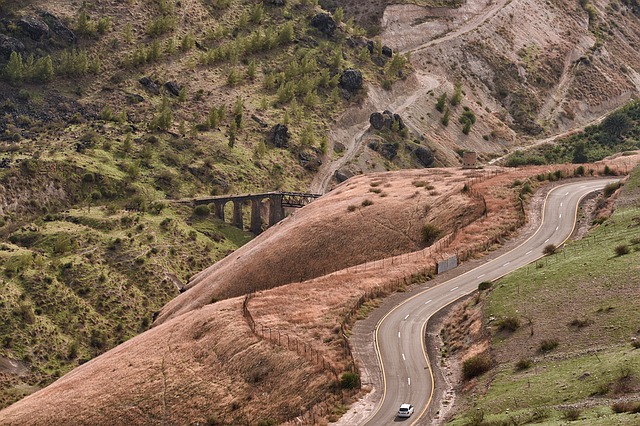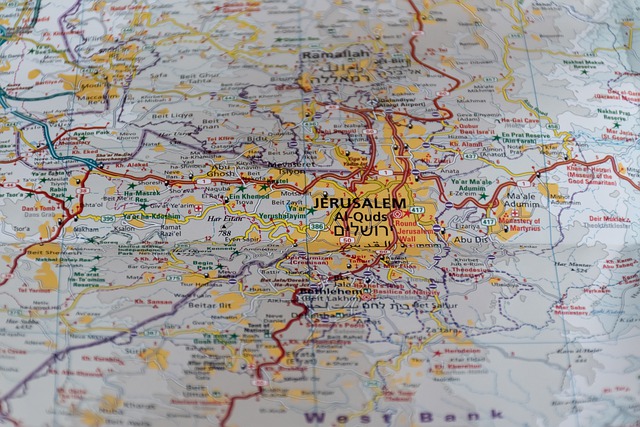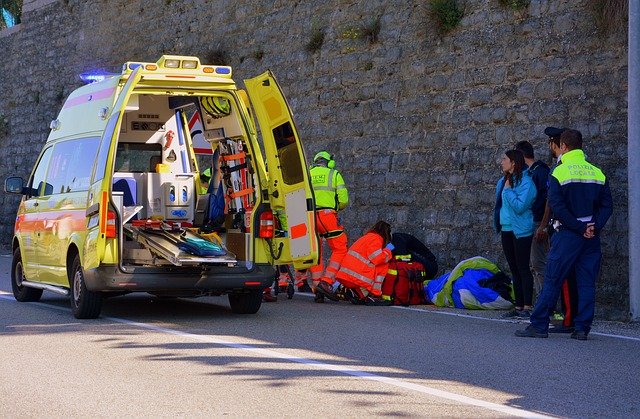Found on the southeast shores of the Mediterranean Sea and north Red Sea shore, Israel has always been an attraction for pilgrims looking for spiritual tranquility.
This country is basking in a fair amount of historical culture, containing elements from every major religion: Christianity, Judaism, and Islam. It is a great place where tourist can become immersed in a variety of activities – Israel has a fair number of unique beauties and tourist attractions.
However, considering that Israel shares borders with Egypt, Gaza Strip, Jordan, Syria, and Lebanon, one cannot help but ask themselves this question: Is Israel safe to visit? It might be called the “Holy Land” – but with the war going at full force in Syria, you might second guess how good an idea it is to visit there.
You will have to exercise precaution – but at the same time, you might also be surprised.
Highest Risk You Expose Yourself to When Visiting Israel

Overall Risks in Israel: MEDIUM
Israel has a fairly low crime rate compared to other countries, which is why it is considered fairly safe to visit. If you want to explore the city by yourself or with your group, the chances of anything happening to you are fairly low. However, like every other place on the earth, you cannot predict the nature of every person inhabiting it – which is why you might want to exercise common sense and precaution.
Generally speaking, Israel is fairly safe – but considering that it lies on the border of Syria and Lebanon, this country is exposed to a fairly high terrorist risk.
Precaution is advised particularly when you board public transport or are visiting fairly populated areas. This is where a high number of Palestinian terrorist groups have been known to conduct activities – which is why you may want to keep an eye out whenever you are boarding a bus.
Pickpocketing and theft are also fairly common, particularly considering the number of low-income families living in Israel. These events, however, happen mainly in destinations that are highly frequented by tourists. You might want to leave any valuable belongings at your accommodation, and only take with you the items that you need.
Unless you need your passport or any other important documentation, you might want to leave it at home. Similarly, unless you particularly need all your money with you, you might want to only take as much as you need that day in cash – and leave your credit cards at home. It’s less of an Israel issue, but more of common sense when traveling one.
Pickpocketing and Theft Risks in Israel: MEDIUM

Israel doesn’t have a pickpocketing risk that is any higher than your average country. Pickpocketers are activating in places that are highly frequented by tourists – taking advantage of those who are too much in awe of their surroundings. Street crime is also fairly common on isolated roads and alleys, mainly because no one will be there to jump in and help you out.
These types of incidents are fairly common in public transit as well – and any other place that is relatively crowded. A pickpocket will easily be able to swipe our phone or wallet from your pocket without you noticing, and then blend in with the other commuters until the next stops.
Airports are also highly packed with pickpockets since terminals are chaotic – with people that are hurrying to get to their destination.
How safe is Israel for tourists when it comes to pickpocketing? Just like any other country. To avoid being a victim of pickpocketers, you might want to be careful of where you keep your belongings. Don’t flash your expensive phones or camera in public – particularly if the area is highly frequented. It’s like you’re begging to be mugged.
- How to avoid pickpocketing and theft in Israel?
Also, whenever you go out to explore Israel, wear clothes that do not have easily accessed pockets – and you might also want to invest in bags and backpacks with anti-theft zippers. This will prevent any prying hands from sneaking in and stealing your belongings.
You might also want to be careful with your belongings when they are out of your bag. For instance, when you are at a terrace or a café, do not leave your phone lying on the table – even if you are at the table yourself. It’s very easy for someone to pretend they are “jogging” and steal your belongings before you manage to process what is happening.
Scam Risk in Israel: LOW

The risk of getting scammed in Israel is not as common as having your belongings quietly stolen. Taxi drivers are relatively fair, and the worst that could happen to you is being overcharged for your ride.
Accommodation scams are also fairly uncommon – the only instances being when people opt for untrustworthy websites. Some stores and vendors might also leave a smaller amount of change than they were supposed to, but this type of scam is not that common either.
- How to avoid getting scammed in Israel?
The rule of thumb when it comes to avoiding being scammed is to double-check everything: double-check that your accommodation was booked through a trustworthy company, double-check that you have received the right change, and double-check that the taximeter has been turned on.
Another good piece of advice would be to never pay for anything upfront. Ideally, you may want to opt for “pay on the site” accommodations and events – an action that will keep you from paying for ghosts.
So, how safe is Israel for tourists? When it comes to scamming, we would say that it is pretty safe.
Kidnapping Risk in Israel: LOW to MEDIUM

It is more likely that you’ll be kidnapped in Canada than you will be in Israel. However, the risk is still there, particularly if you consider the war that is going on in Syria. The average in Israel is five kidnappings for every 100,000 people – all of which happened in unforeseen circumstances. The trends seem to be going lower, as Israel is still considered an oasis in a time of war.
- How to avoid getting kidnapped in Israel?
In order to avoid being a victim of kidnapping, you might want to use common sense and avoid doing the things that will definitely get you kidnapped. For starters, you should avoid walking around alone at night, particularly on streets that are deserted by people.
Crowded streets are also a very good place for people to get kidnapped – particularly children. It’s very easy for a child to get “swiped” from a crowd of people walking in every other – which is why you should be particularly careful of the people around you. Exercising caution could help save your life.
You may also want to avoid remote areas that you do not know – particularly if it’s at night. Avoid staying around the border for Syria as well, since that is where most kidnappings generally take place. Stick to the places with an abundance of light – and stay away from the red areas.
Terrorism Risk in Israel: HIGH

Considering that Israel shares borders with Syria, Egypt, and Lebanon, it is very likely that a terrorist act is going to happen. These acts are generally more common around the border – but you still might want to be careful when boarding a bus or a train. Terrorists have a habit of attacking environments where the victims can’t easily getaway.
- How to avoid terrorism in Israel
To avoid an attack, you might want to read an Israel safety guide on this topic. Generally, terrorist attacks are held in order to make a political statement – which is why they will target a crowd rather than a random passer-by.
Be careful when you are visiting public tourist spots and public transportation; if you see people acting suspiciously, then trust your guy and get away from there as soon as possible.
Risks for Women Traveling Alone in Israel: LOW

Traveling as a woman in Israel is fairly safe, as long as you practice common sense. Stick to the crowded areas of the city that you are visiting, and avoid walking around alone at night.
The clothing that you wear should also be chosen carefully, as pieces that are too revealing might attract unwanted attention. Therefore, if you are asking yourself “is Israel safe for solo women travelers,” the answer is yes – but only as long as you properly assess your surroundings.
- How to avoid crime as a solo woman traveler in Israel?
You have to be really careful when picking your outfit for the day - moreover, doing a bit of research regarding the country's customs and such may tell you much more about how you should dress, behave, and act towards the locals.
But, in general, this is the only thing you should be worried about when traveling in Israel - just a bit of common sense and paying attention to your surroundings will ensure your safety.
Rape Risk in Israel: LOW to MEDIUM

The risk of being raped in Israel is debatable – mainly depending on the circumstances that you are traveling in. In 2012, around one out of three Israel women were victims of rape or attempted sexual assault – but these mainly happened around the borders of Syria. As long as the women stayed within the vicinity of the capital or the more populated areas, there would be no reason for concern.
The farther away you are from the border, the safer it becomes to travel around as a woman – without being subjected to sexual assaults. The rare occurrences that took place were because the women walked in shady areas, without taking proper precautions. Reading some Israel safety travel tips can usually be very helpful in these circumstances.
- How to avoid getting raped in Israel?
So, is Israel safe for solo women travelers? Yes and no – depending on what you do. Once you are a victim, there is nothing that will be able to erase the trauma. Whether or not you get justice will do little to make you feel any better – because your life will forever be changed.
Precaution is golden in these kinds of circumstances. To avoid these kinds of circumstances, you simply have to use common sense on proper conduct for women.
First of all, when going to Israel, you might want to avoid wearing clothes that are too revealing – lest you actually want to attract the attention of a potential rapist. The more you blend into the background, the lower the risk will be.
Secondly, you might also want to avoid deserted or poorly lit areas. Try to steer clear of bars or people where drunken people hang around; those are the most likely to commit sexual assault. For further info on how to avoid rape, you might want to read an Israel safety guide on this particular topic.
Risks for People Traveling with Children in Israel: LOW

Is Israel safe to visit if you are planning a trip with your child? Technically, there should not be any problem; while poverty might be a problem there, Israel is still considered a “holy land” – and is, therefore, fairly peaceful.
- How to avoid unwanted scenarios?
However, you might want to always hold the hand of your kid whenever you are traveling in crowded places. Not only are children easily lost in this kind of environment – but the worst can also happen, and they can easily be kidnapped. Keep a close eye around your surroundings and watch your child like hawk, just to be safe.
Natural Disaster Risks in Israel: MEDIUM
Considering that Israel is a relatively seismically active area, the risk of an earthquake hitting when you least expect it is fairly high. You can also expect the occasional flood and sand storm – which is why you might want to acquaint yourself with the climate. By reading Israel safety travel tips, you will know precisely what the right time to travel is.
Transportation Risks in Israel: MEDIUM

Road travel in Israel can be described as unpredictable most of the time - there are frequent road accidents, even though there are more than enough radar speed traps that operate throughout Israel.
Be aware of the fact that the speeding fines are quite high - thus, by driving safely you won't avoid just these fines, but you will also decrease the risks of getting into an accident.
If you plan on driving in the West Bank, you should double-check your insurance before your travel and, obviously, make sure that you are, in fact, insured. Some sources also recommend you to get West Bank insurance from one of the East Jerusalem hire companies, rather than getting one from an Israel-based hire car company.
Obviously, you don't want to travel alone in the desert - make sure that you are in a compact group, that you have enough water and a decent mobile phone. Moreover, you should let your accommodation staff or someone else close to you know your itinerary as well as the expected time of your return.
Night-Clubs, Pubs, and Bar Risks in Israel: LOW
Being the country that it is, it is most likely that you won't visit Israel with the purpose of discovering its nightclubs, pubs, and bars. However, if you do decide to do so, you shouldn't face any problems while enjoying a drink.
Still, it is recommended that you don't leave your drink unattended and that you don't accept drinks from strangers - in some cases, other tourists/ travelers will try to take advantage of you by spiking your drink.
Thus, be careful when around both locals and tourists - you may never know what they have in mind. Better safe than sorry, as they say.
Health Risks in Israel

First of all, be aware of the fact that Israel's healthcare is not free - moreover, medical treatment can be quite expensive in some cases. Thus, make sure to come equipped with proper travel health insurance and enough funds to cover any unexpected treatment.
Furthermore, hospitals may rely on legal action in order to delay your departure until you pay your bills - in short, have enough money/ funds on you.
List of Vaccines You Need when Visiting Israel
When you are traveling to Israel, there are several routine vaccines that you might want to get – such as measles, tetanus, meningitis, of influenza. However, the following travel vaccinations are also recommended:
- Hepatitis A
- Hepatitis B
- Rabies
- Typhoid
- Anthrax
Once you have has these shots, it should be safe for you to travel.
Most Dangerous Areas in Israel

- Jerusalem's Mea She'arim Neighborhood - if you plan to visit this place, it is recommended that you comply with all of the country's customs, in terms of dress code, modesty, and such. The residents can get quite angry if you don't enter their neighborhood in a modest manner.
- South of Tel Aviv - reportedly, this area is known as the home of illegal immigrants, drunk people, and such.
Concluding Remarks:
So, how safe is Israel, really? All things considered, it’s fairly safe to travel to. Granted, the terrorist attacks are a concern, and the occasional military riots may put a blunder in your vacation – but as long as you follow the proper precautions, there should be no problems.
The crime level is fairly low, locals are friendly to those looking for spiritual guidance – and as long as you keep an eye open to your surroundings, you should be safe.


